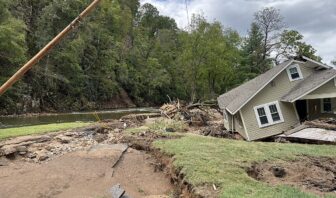Innovative approach would help cities adapt and promote clean energy while reducing carbon pollution; action builds on current climate talks in Paris
NORFOLK—A bipartisan group of Virginia leaders gathered in Norfolk today to push for passage of comprehensive state legislation in the 2016 General Assembly to combat the local impacts of flooding and promote clean energy solutions. They highlighted the need for local action on climate change even as world leaders meet in Paris to bolster global commitments.
The bill, called the Virginia Coastal Protection Act, would generate about $250 million per year to invest in flood-protection measures, as well as energy efficiency, clean energy and job training programs. It would do so by adding Virginia to a regional market-based system that caps and reduces carbon pollution.
In recent months, city governments across the state—including Virginia Beach, Hampton, Newport News, Norfolk, Fredericksburg, and Staunton—and the Virginia Municipal League have endorsed the bill as a 2016 priority.
Republican State Delegate Ron Villanueva of Virginia Beach joined coastal city officials and the former commanding officer of Naval Station Norfolk for a waterside press conference this morning to announce introduction of the bill into the 2016 General Assembly with Democratic Senator Donald McEachin of Richmond.
“The Virginia Coastal Protection Act is the best path forward to protect flood-prone communities while combating climate change and growing our economy,” said Delegate Villanueva. “With so many homes, businesses, and military assets at risk from rising seas, the urgent need for action is clear. This bill unlocks hundreds of millions of dollars to kick-start practical solutions.”
“This year, I will be re-introducing legislation that will reduce carbon emissions while helping localities to combat flooding and impacts from sea level rise,” said Senator McEachin.
Some activists wore bright yellow rain boots to dramatize the struggle many coastal citizens already face in getting to work or school amidst high tides or heavy storms. Experts say the city of Norfolk alone needs $1 billion to adapt to encroaching waters. Severe weather events—such as heavy rainfall that washed out roadways in Southwest Virginia in late September—are causing increasingly costly damage across Virginia.
“It’s time to create the state’s first dedicated funding source to help localities along the coast and beyond deal with the impacts of climate change,” said Virginia Beach City Councilmember Rosemary Wilson, past president of the Virginia Municipal League and a current member of VML’s Legislative Committee. “This is a win-win policy with the support of cities across Virginia.”
The benefits of the bipartisan climate bill would extend far beyond flood protection. Under the legislation, Virginia would join a system called the Regional Greenhouse Gas Initiative (RGGI) that has a track record of lowering greenhouse gas emissions while lowering utility bills in nine states from Maine to Maryland. Virginia would be poised to meet its requirements under the federal Clean Power Plan while gaining new revenue—about $250 million per year through 2030—to support climate resilience and economic development.
The Virginia Coastal Protection Act would direct a full half of the funds generated to help localities throughout the state combat flooding caused by sea-level rise and severe weather. The second-largest portion of funds would support energy efficiency programs that save consumers money. Additional funds would promote solar power and support jobs programs for families and businesses in Southwest Virginia.
Retired Navy Captain Joe Bouchard joined today’s press conference to urge the General Assembly to act on this comprehensive climate plan for another reason: national security.
“Virginia’s response to climate change impacts the readiness of the world’s largest Naval base,” said Bouchard, who is a former commanding officer of Naval Station Norfolk. “The Navy could spend hundreds of millions of dollars protecting the base from sea level rise; but it cannot function if the cities around it are crippled by rising waters.”
“Adapting to the impacts here now must go hand in hand with transitioning to clean energy solutions,” added Bouchard. “That is the Defense Department’s strategy, and it is the right strategy for Virginia, too.”
The Virginia Coastal Protection Act has gained a broad array of support since its original introduction in the 2015 General Assembly. The Virginia Housing Coalition, the Virginia Chapter of the American Association of Pediatrics, Virginia Organizing, the Union of Concerned Scientists, and all of Virginia’s statewide environmental groups have called for its passage. The editorial boards of the Virginian-Pilot, the Washington Post, and the Richmond Times-Dispatch have all penned pieces in support of its regional carbon-cutting approach.
“From Paris to Richmond, the actions we take now will determine how high the water goes and whether our communities are able to stay safe,” said Dawone Robinson, Virginia policy director at the Chesapeake Climate Action Network. “In 2016, the General Assembly and Governor McAuliffe must take action. Virginia can do our part to lower emissions, in a way that saves consumers money, creates new jobs, and brings real resources to communities facing dangerous flooding now.”
A fact sheet on the Virginia Coastal Protection Act is available at: http://chesapeakeclimate.org/wp-content/uploads/2015/01/2016-CCAN-VA-Coastal-Protection-Act-Factsheet.pdf
An overview of the benefits of Virginia joining the Regional Greenhouse Gas Initiative is available at: http://chesapeakeclimate.org/wp-content/uploads/2014/03/VA-RGGI-Fact-Sheet-UPDATED-8.10.15.pdf
Contact:
Kelly Trout, 240-396-2022, kelly@chesapeakeclimate.org
Dawone Robinson, 804-767-0372, dawone@chesapeakeclimate.org
###





